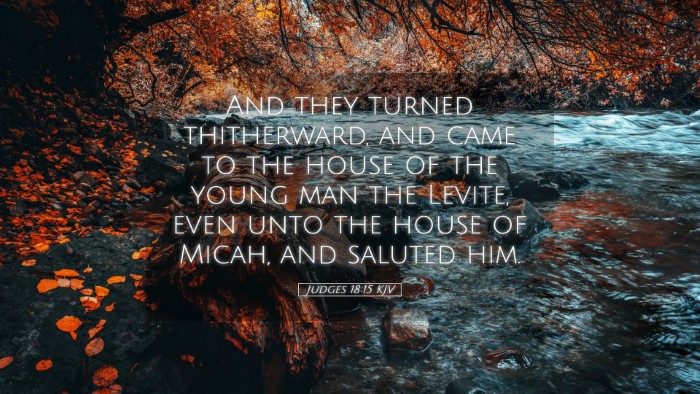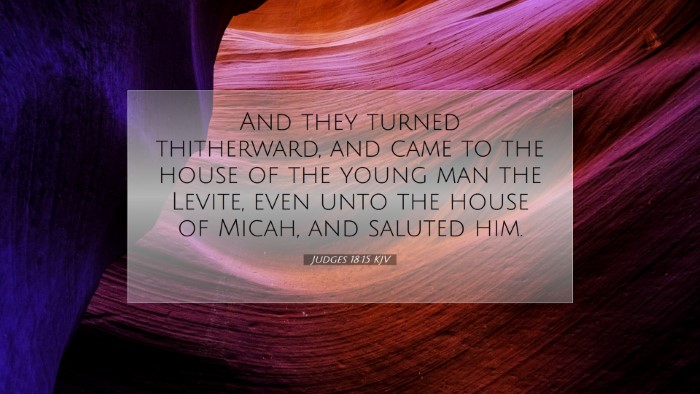Commentary on Judges 18:15
Introduction
Judges 18:15 presents a pivotal moment in the narrative of the tribe of Dan as they seek to establish a foothold in the land promised to them. This verse reads: "And they turned aside thither, and came to the house of the young man, even to the Levite, even unto the house of Micah, and saluted him." This brief encounter lays the groundwork for significant developments in Israel's history and reveals deeper theological implications regarding idolatry, leadership, and divine guidance.
Contextual Background
The book of Judges chronicles a turbulent period in Israel's history following their conquest of Canaan. The Israelites, having settled in their respective territories, frequently fell into cycles of sin, oppression, repentance, and deliverance. The tribe of Dan, specifically, faced difficulty in securing their territory (Judges 1:34). As they continued in this struggle, the exploration led them to Micah's house, a place of idolatry.
Exegesis of Judges 18:15
This verse serves as a gateway to understanding both the physical and spiritual journey of the Danites.
- Physical Journey: The movement of the tribe indicates a thirst for a better settlement. Their visit to Micah suggests both a search for security and perhaps a theological misstep.
- Spiritual Condition: The Levite's presence in Micah’s house indicates a corruption within the priestly line, as he forsook the proper worship of Yahweh in favor of serving idols.
Theological Reflections
The encounter with the Levite encapsulates the broader themes present in Judges, namely the crisis of leadership and the sufficiency of God's guidance.
Leadership Crisis
Matthew Henry comments on the leaders of Israel's failure during this time. The Levite’s role in providing services for Micah's idols reflects a broader indictment of Israel’s spiritual leaders who have compromised their fidelity to God. Without strong, faithful leadership, the people stray, showcasing the necessity of righteousness among those who lead.
Idolatry and Its Consequences
Albert Barnes observes the gravity of the Danites' actions. By seeking counsel from a Levite involved in idol worship, they exemplified the ongoing apostasy present in Israel. This moment foreshadows disastrous consequences, which include God’s judgment and the eventual scattering of the tribes into disarray.
Insights from Historical Context
Adam Clarke provides insights into the historical significance of the passage, noting that the Levite's conduct exemplifies the moral decay that characterized much of Israel's history during the Judges period.
- The Levite's availability to serve Micah and the Danites indicates the deterioration of priestly standards.
- The episode reinforces the theme of Israel turning to foreign gods and abandoning their covenant relationship with Yahweh.
- This interaction between the Danites and the Levite signals a blending of pagan practices with Israelite religion, leading to further spiritual degradation.
Application for Today
The passage implores contemporary believers, especially leaders in the church, to maintain fidelity to God's standards in their leadership. It serves as a warning against the dangers of syncretism—blending faithful worship with secular practices. The spiritual lessons gleaned from this narrative can guide pastoral practice, encouraging discernment and a return to uncompromised worship.
- Importance of Biblical Leadership: The integrity of leaders must reflect biblical standards to avoid leading others astray.
- Rejecting Idolatry: Modern parallels can be drawn from the pursuit of materialism and false teachings that might corrupt personal and communal faith.
- Vigilance in Faith: The example of the Danites reminds believers of the need to remain vigilant against ways the world influences faith practices.
Conclusion
Judges 18:15 serves as a microcosm of the larger narrative effectually conveying the consequences of failing to adhere to divine guidance. By combining insights from public domain commentaries, we can discern the significance of this encounter for understanding the historical and spiritual landscape of Israel. It invites believers today to reflect critically on their commitment to God amidst a culture that often seeks to dilute true worship.


